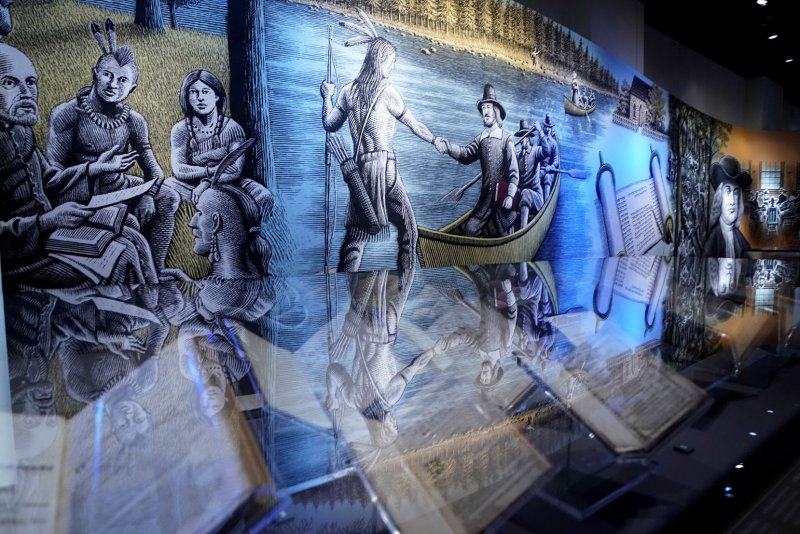1 of 14 | An exhibit on the spreading of religion is seen during a preview Wednesday at the Museum of the Bible in Washington, D.C. Photo by Kevin Dietsch/UPI |
License Photo
Nov. 15 (UPI) -- The 430,000-square-foot Museum of the Bible, funded in large part by the family that owns craft retailer Hobby Lobby, is set to open in Washington, D.C., Friday.
A private ribbon-cutting ceremony to open the new venue, expected to be attended by Israeli officials and religious dignitaries, is scheduled for Friday. The museum will open to the public Saturday.
The eight-floor museum will feature some 1,600 artifacts -- from a copy of a Bible owned by Elvis Presley, to portraits of Mary. There also will be high-tech elements, including a digital ceiling and touch-screen tablets, for visitors to use to guide them through the museum. At least three-quarters of the items will be Bibles.
The front doors of the Bible Museum are 40-foot brass replicas of the cover of the Book of Genesis in the Gutenberg Bible, the first Bible mass produced and made available to the wider public in the 1400s.
A portion of the third floor is a recreation of the village of Nazareth as it would have been during Jesus' time.
Officials said although some might interpret the museum's aim to be evangelizing to visitors about Christianity, its attempts are more secular and educational in nature.
"We've never viewed it as evangelical outreach at all. It's just part of the history of the Bible. And we're showing it in this great way," museum President Cary Summers told reporters.
Summers said the museum's two largest donors -- the Green family and the National Christian Foundation -- have "not tried to interject their personal points of view at all."
Seth Pollinger, director of museum content, said, "secular audiences will be surprised at the influence of the Bible" on popular culture.
Photo by Kevin Dietsch/UPI
What remains to be seen is to what extent, if any, a recent artifact-smuggling case involving Hobby Lobby President Steve Green will overshadow the debut of the $500 million museum.
Some of the exhibits are donated by Green, whose family has collected about 40,000 artifacts worth more than $205 million over the past eight years. Observers note that the museum, though, may be trying to distance itself from the family after their collecting practices came under scrutiny this year.
In July, Hobby Lobby agreed to pay $3 million and return more than 100 historic artifacts from modern-day Iraq that Green purchased in Dubai. He paid $1.6 million for 5,500 pieces, including 4,000-year-old cuneiform tablets and stone cylinders, in 2010.
The Department of Justice found that the company had the tablets shipped to its Oklahoma headquarters, but that the boxes were labeled as containing ceramic tile samples. Green promised more oversight at the time, and blamed the incident on his own inexperience as a collector.
"We made mistakes, but we've learned from them," he said.
"Before this, we weren't collectors or museum-goers," Green added. "We didn't know we needed to ask for all this paperwork" to prove provenance.
Proving prior ownership of an artwork or artifact is meant not only to verify the authenticity of the piece, but to prevent the sale of looted items.
The misstep could cast doubt on the veracity of other objects the Green family owns, including some that are on display at the Museum of the Bible.
Josephine Dru was the former curator of the Greens' collection of papyri; she left after three years over concerns about how the museum handled the provenance of some manuscripts.
"The Greens are good people, and they wanted to find important artifacts to study, but the situation may end up hurting some of the scholars and students they wanted to help," she told The Wall Street Journal.
Museum Director David Trobisch said the museum has rejected some donations made by the family, over questions of prior ownership -- and said most of the Greens' collection remains with the family and the museum will have 2,840 vetted artifacts in its permanent collection.
The museum's board has hired a cultural heritage lawyer to authenticate all items in the collection.
"We feel like we're paying for the sins of the father," Trobisch said.
















